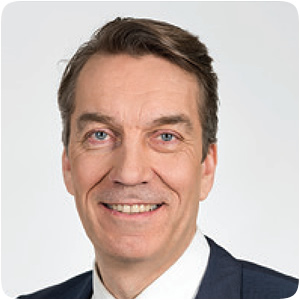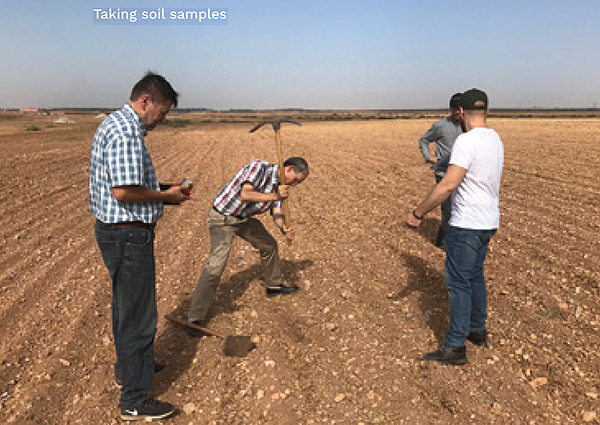 Nordic energy company St1 has signed an agreement with the Université Mohammed VI Polytechnique in Morocco and its affiliated fertiliser company, OCP, for the implementation of an afforestation pilot. Over a period of three years, the project will examine the carbon sequestration by trees under various controlled conditions in Morocco. The pilot is a major step towards creating a validated and approved tool for combating climate change through carbon sinks created via afforestation.
Nordic energy company St1 has signed an agreement with the Université Mohammed VI Polytechnique in Morocco and its affiliated fertiliser company, OCP, for the implementation of an afforestation pilot. Over a period of three years, the project will examine the carbon sequestration by trees under various controlled conditions in Morocco. The pilot is a major step towards creating a validated and approved tool for combating climate change through carbon sinks created via afforestation.
The carbon sequestration is essential
Climate change is the biggest problem facing the humankind, as it is leading to rapid and dramatic changes in our planet’s ecosystem. Numerous forecasts indicate that the objective of the Paris Climate Agreement – to limit global warming to less than 2°C – will not be achieved by the current policies and mitigation tools only. A recent report by the Intergovernmental Panel on Climate Change (IPCC) confirms the impossibility of achieving the objective by current means, and highlights that the range of methods require carbon sinks, such as new forests.
Emissions will be further increased by the rapid growth of population, economies and energy demand in developing countries. In addition, some 100 billion tonnes of excessive carbon is already in the atmosphere, which only can be removed through extensive afforestation and reforestation activities. As the problem is global, the mitigation activities should not be artificially constraint to national activities only. Viable land areas could be increased through large-scale afforestation of arid regions. Locally accepted afforestation projects combined with agriculture would help the people in regions affected by drought and desertification, thereby reducing migratory pressures.
Moroccan pilot contributes to the creation of a powerful tool for urgent need
The goal of the pilot is to find the optimal solution for the use of land improvement and irrigation systems in cost-effective forest growth and carbon sequestrating. A total of 16,000 seedlings acquired from Morocco will be planted in a four-hectare research area in Rhamna Ben Guerir. Planting will begin in January and the project will involve testing seven tree species, including carob, eucalyptus and acacia. Various types of soil improvement, such as water retention improvements and fertilisation, will be performed to provide a viable substrate in the currently dry soil. In addition, the project will involve studying the role of irrigation and the optimisation of water consumption by using a sub-surface drip irrigation system.
The first results of the three-year pilot will be obtained in a year’s time. The university will implement a practical eufield test to study and measure the trees’ growth both above and below ground. As a partner, LUKE, the Natural Resource Institute Finland, will contribute technical and practical forest know-how and expertise to the project, by directing and monitoring the field test. In addition, the project will involve a local farmer, on whose land different growing methods will be tested.

Scientists developing an international measuring concept for carbon sequestration
An internationally accepted and standardised method of carbon measurement is an absolute prerequisite, if carbon sinks created through afforestation are to become an official and commercial method of reducing carbon dioxide emissions. During the summer, the University of Helsinki began a measurement conceptualisation project with the aim of creating an internationally accepted comprehensive measurement method for carbon-sequestrating projects. During the project, in collaboration with the Finnish Meteorological Institute and ICOS RI (International Carbon Observation System Research Infrastructure), the University of Helsinki will create a comprehensive concept about how the climate effects of forests and carbon sequestration in forest trees, soil and other forest plants can be reliably measured. The research group will also create recommendations for how the world’s carbon sinks can be reinforced and what kinds of measuring equipment and methods should be used to measure them. An internationally accepted comprehensive measurement method for carbon-sequestrating would enable the carbon trading of the future.
EU should add afforestation to its climate policy
Only the private sector has sufficient financial resources for rapid large-scale global afforestation. However, companies are currently lacking the business case to engage with and invest in biogenic carbon sequestration. EU's current climate policy does not allow to use carbon sinks as a tool in the Emission Trade nor in Effort Sharing sectors, such as transport for example, although negative emissions are described as imperative in the global climate work. In addition to all current climate mitigation methods and tools, measurable, auditable and transparent carbon sequestering through afforestation needs to be added to the means of combating climate change as soon as possible. Carbon sinks has to be seen as an incremental tool, not as substitutive one. We must harness the financial strength of the companies in creating carbon sinks through enabling companies to fulfill part of their greenhouse gas reduction or renewable energy targets with carbon sequestration. If we don't do it, the mankind will lose the battle of climate.
How to harness carbon sequestering for common global use
- A market place for the atmospheric carbon cycle must be created (CO2 Exchange). Companies emitting and capturing carbon would trade CO2 in the market place, thus create a market price for CO2.
- The amount of sequestrated CO2 must be reliably measured according to the standardized methods
- For the emitted CO2 there are already international standards and calculation rules in place.
- An international standardized, by the scientific world accepted, measurement concept for the sequestrated CO2 is needed.
- pilot is needed, where the feasibility and reliability of the measurement concept can be demonstrated and proved.
For further information please contact:
Mika Aho,
Director, Public Affairs, St1 Nordic Oy,
Tel: +358 50 500 2072
Email: mika.aho@st1.fi
Website: www.st1.eu